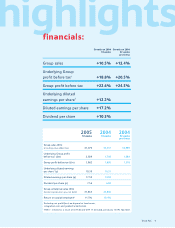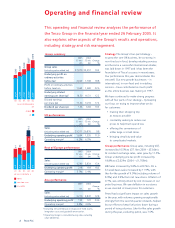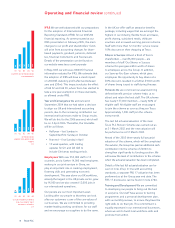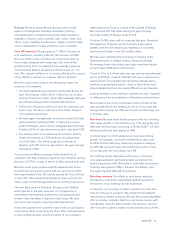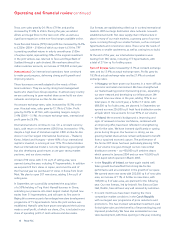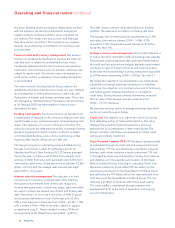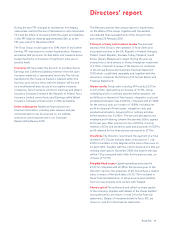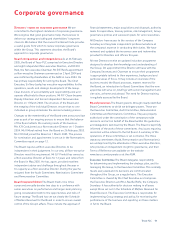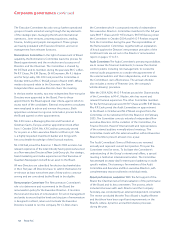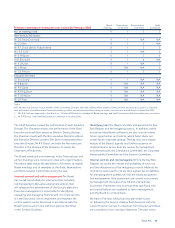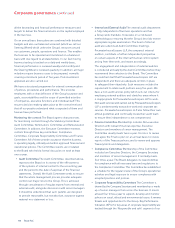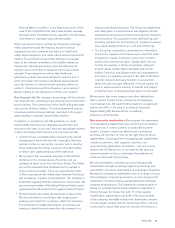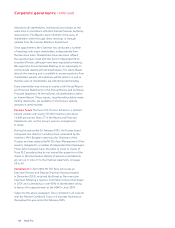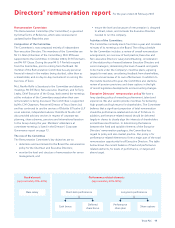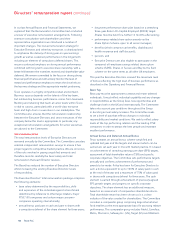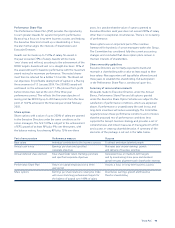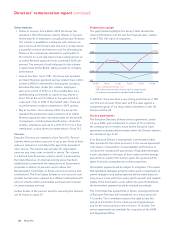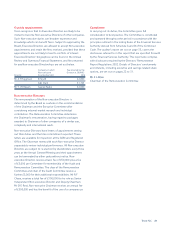Tesco 2005 Annual Report Download - page 13
Download and view the complete annual report
Please find page 13 of the 2005 Tesco annual report below. You can navigate through the pages in the report by either clicking on the pages listed below, or by using the keyword search tool below to find specific information within the annual report.Tesco PLC 11
Corporate governance
Directors’ report on corporate governance We are
committed to the highest standards of corporate governance.
We recognise that good governance helps the business to
deliver our strategy and safeguard shareholders’ long-term
interests. We believe that the revised Combined Code provides
a useful guide from which to review corporate governance
within the Group. This statement describes the Board’s
approach to corporate governance.
Board composition and independence As at 26 February
2005, the Board of Tesco PLC comprised six Executive Directors
and eight independent Non-executive Directors, and Mr D E
Reid, the Non-executive Chairman. Mr D E Reid’s appointment
as Non-executive Chairman commenced on 2 April 2004 and
was confirmed by shareholders at the AGM in June 2004. He
has primary responsibility for running the Board. The Chief
Executive, Sir Terry Leahy, has executive responsibilities for the
operations, results and strategic development of the Group.
Clear divisions of accountability and responsibility exist and
operate effectively for these positions. Mr R F Chase became
Deputy Chairman and Senior Independent Non-executive
Director on 1 March 2004. The structure of the Board and
the integrity of the individual Directors ensure that no one
individual or group dominates the decision-making process.
Changes to the membership of the Board were announced last
year as part of an ongoing process to ensure that the balance
of the Board reflects the evolving needs of the business.
Mrs K R Cook joined as a Non-executive Director on 1 October
2004. Ms V Morali retired from the Board on 26 February 2005.
Ms C McCall joined the Board on 1 March 2005. The process
for nomination and appointment is set out in the Nominations
Committee report on page 12.
The Board requires all Non-executive Directors to be
independent in their judgement. In our view, all Non-executive
Directors meet this requirement. Mr G F Pimlott has served as
a Non-executive Director at Tesco for 12 years and retires from
the Board in May 2005. He has, again, provided excellent
independent advice and challenge throughout the year in
his capacity as a Non-executive Director. During the year he
resigned from the Audit Committee, Nominations Committee
and Remuneration Committee.
Board responsibilities The Board meets nine times
a year and annually devotes two days to a conference with
senior executives on performance and longer-term planning
giving consideration both to the opportunities and risks of
future strategy. The Board has set out clearly the Schedule
of Matters Reserved for the Board in order to ensure overall
control of the Group’s affairs. These include the approval of
financial statements, major acquisitions and disposals, authority
levels for expenditure, treasury policies, risk management, Group
governance policies and succession plans for senior executives.
All Directors have access to the services of the Company
Secretary and may take independent professional advice at
the company’s expense in conducting their duties. We have
reviewed and updated the insurance cover and indemnities
provided for Directors and officers this year.
All new Directors receive an updated induction programme
designed to develop their knowledge and understanding of
the Group. On appointment the Director will liaise with the
Company Secretary and Chairman to ensure their programme
is appropriately tailored to their experience, background and
particular areas of focus. It may include an overview of the
business model, the Board processes, matters reserved for
the Board, an introduction to Board Committees that the new
appointee will serve on, briefings with senior management and
site visits, at home and abroad. The need for Director training
is regularly assessed by the Board.
Board processes The Board governs through clearly identified
Board Committees to which we delegate powers. These are
the Executive Committee, Audit Committee, Remuneration
Committee and Nominations Committee. They are properly
authorised under the constitution of the company to take
decisions and act on behalf of the Board within the guidelines
and delegations laid down by the Board. The Board is kept fully
informed of the work of these committees. Any issues requiring
resolution will be referred to the full Board. A summary of the
operations of these committees is set out below. The three
statutory committees (Audit, Remuneration and Nominations)
are underpinned by the attendance of Non-executive Directors,
who provide an independent insight to governance, and their
Terms of Reference are available on the website
www.tesco.com/corporate or at the AGM.
Executive Committee The Board delegates responsibility
for determining and implementing the strategic plan, and for
managing the Group, to the Executive Committee. This normally
meets every week and its decisions are communicated
throughout the Group, on a regular basis. The Executive
Committee is chaired by the Chief Executive and comprises
the Executive Directors and Ms L Neville-Rolfe, the Company
Secretary. It has authority for decision making in all areas
except those set out in the Schedule of Matters Reserved for
Board Decision. The Executive Committee is responsible for
implementing Group strategy and policy, for monitoring the
performance of the business and reporting on these matters
in full to the Board.


